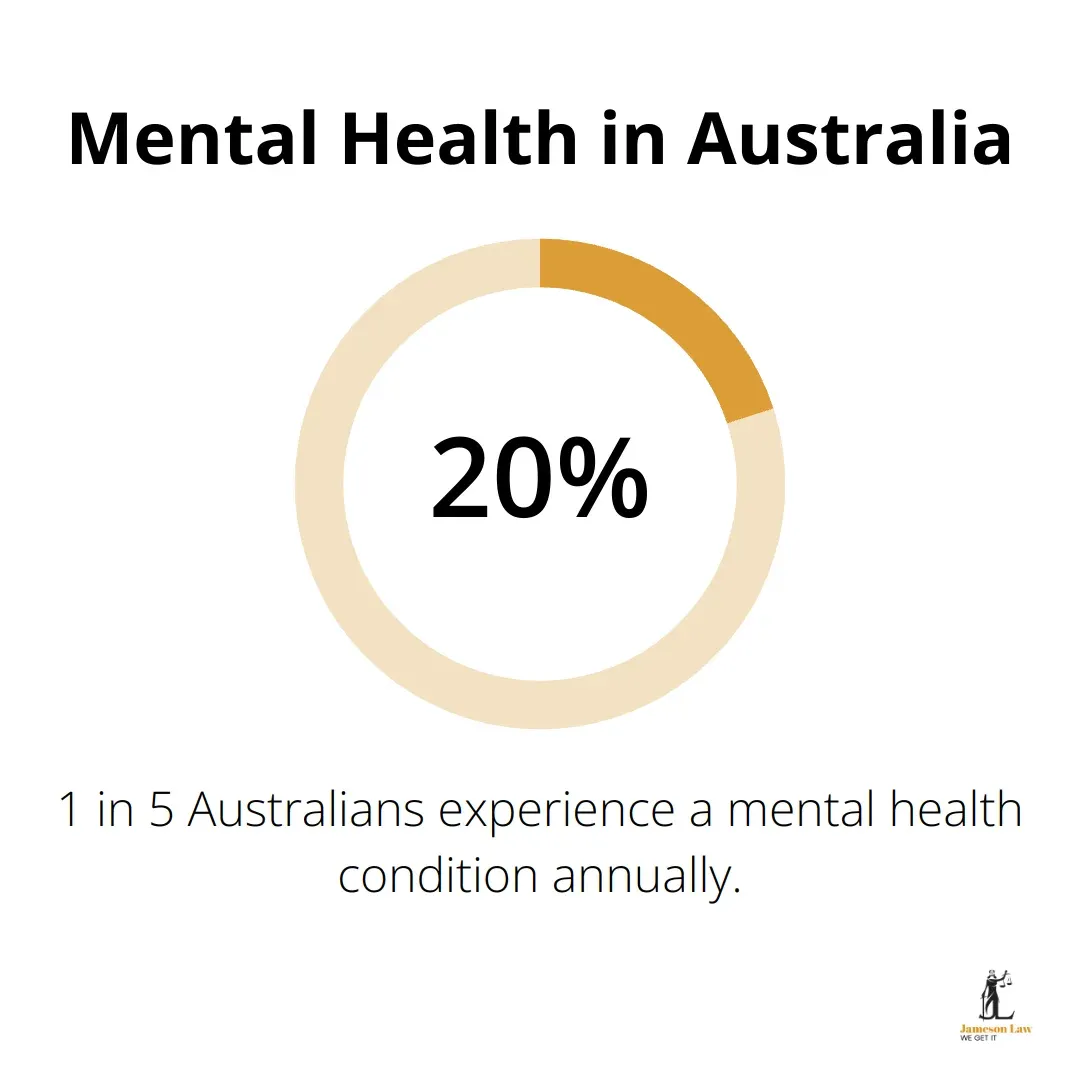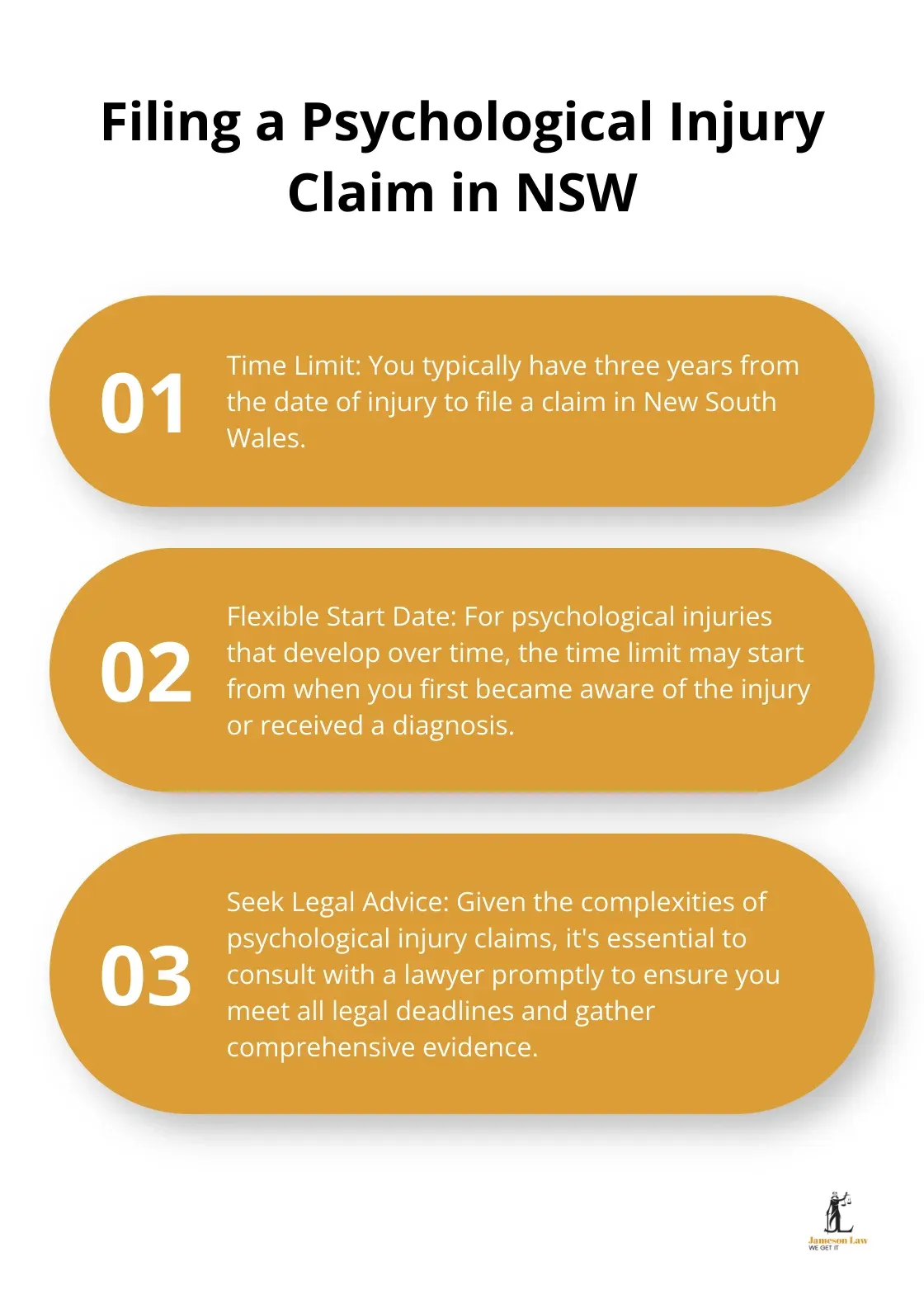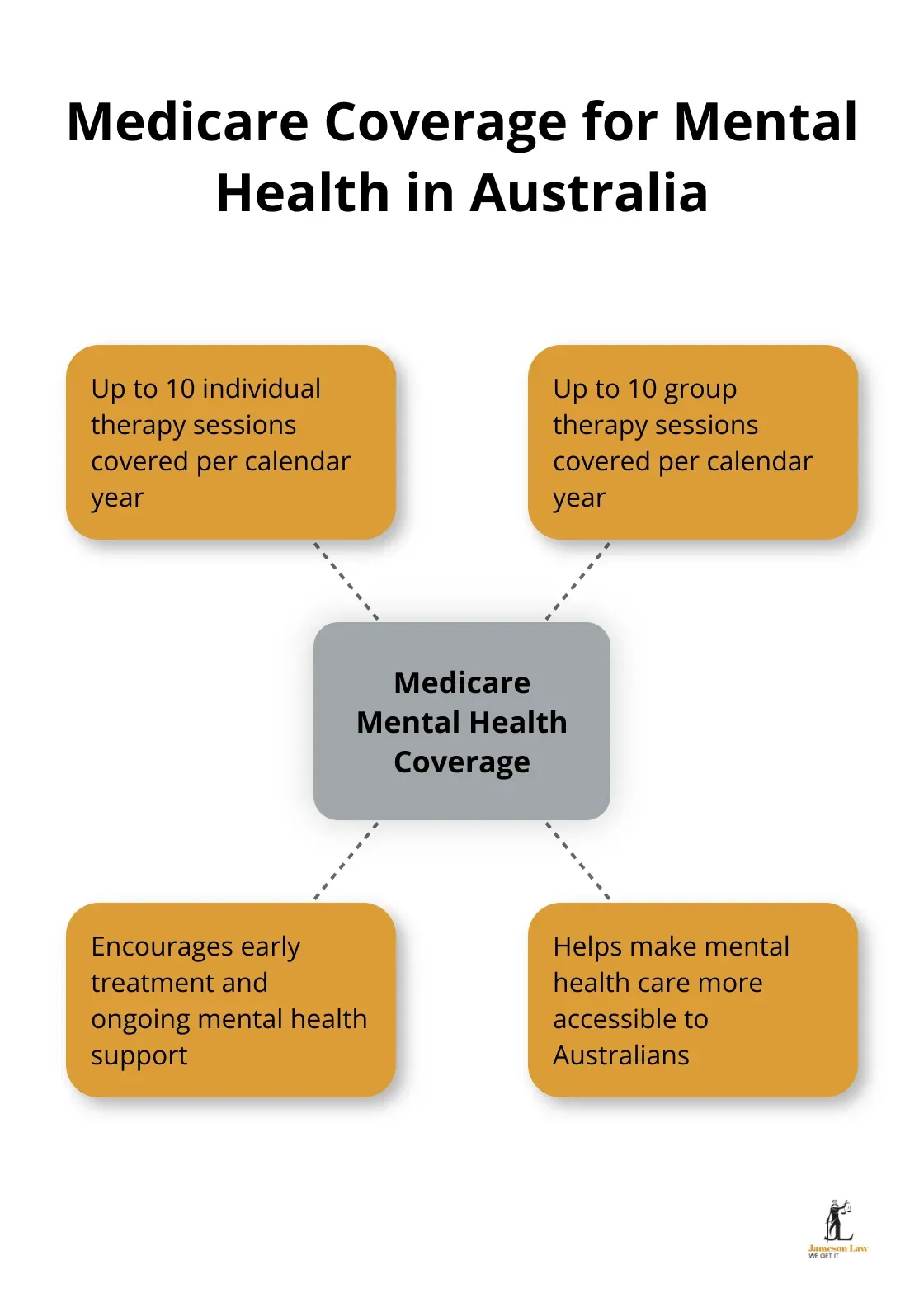Psychological injuries can be just as devastating as physical ones, yet many people are unsure how to seek compensation for these invisible wounds. At Jameson Law, we’ve seen first-hand the impact these injuries can have on individuals and their families.
Common law claims for psychological injury offer a path to justice and recovery for those affected. This guide will walk you through the process of filing such claims, helping you understand your rights and the steps involved.
Based in Sydney/NSW? Speak with our psychological injury team on (02) 8806 0866 or request a callback. Explore personal injury services and our No Win, No Fee options.
What Are Psychological Injury Claims?
Definition and Legal Recognition
Psychological injury claims in Australian law represent legal actions taken when a person suffers mental harm due to another party’s negligence or wrongful act. These claims have gained significant recognition in our legal system, reflecting the growing understanding of mental health impacts.
Australian courts now acknowledge various forms of emotional distress as valid forms of harm that warrant compensation. Compensation can cover medical expenses, lost wages, and pain and suffering. See the NSW framework in the Civil Liability Act 2002 (NSW).
Types of Psychological Injuries
The most common psychological injuries in claims include:
![]() Post-traumatic stress disorder (PTSD)
Post-traumatic stress disorder (PTSD)
![]() Depression
Depression
![]() Anxiety disorders
Anxiety disorders
![]() Adjustment disorders
Adjustment disorders
According to the Australian Institute of Health and Welfare (AIHW), about 1 in 5 Australians experience a mental health condition in any given year. This statistic underscores the prevalence of mental health issues and the potential for psychological injury claims.

Workplace bullying, traumatic events, and severe stress can all lead to compensable psychological injuries. In 2022, accepted workers’ compensation claims accounted for just 0.33% of the more than four million Australian workers who reported having a chronic mental health condition, highlighting the significant impact of workplace factors on mental health (see Safe Work Australia – Psychological health).
The Invisible Nature of Psychological Injuries
Unlike physical injuries, psychological injuries aren’t immediately visible. This invisibility can make them challenging to prove and quantify. However, the effects can be just as debilitating as physical injuries, if not more so.
The Australian Bureau of Statistics reports that people with mental health conditions are more likely to be unemployed or not in the labour force compared to those without mental health conditions. This statistic illustrates the profound impact psychological injuries can have on a person’s ability to work and function in daily life.
Impact on Daily Life and Work
Psychological injuries can significantly affect various aspects of a person’s life. They can impair cognitive function, disrupt sleep patterns, and strain personal relationships. In the workplace, these injuries may lead to decreased productivity, increased absenteeism, and difficulties in maintaining employment.
For instance, a person suffering from severe anxiety due to workplace trauma might struggle with tasks they previously found manageable. They might avoid certain situations or locations associated with their trauma, limiting their ability to perform their job effectively. See practical guidance via healthdirect.gov.au and NSW Health – Mental health.
The Role of Legal Representation
Navigating psychological injury claims can be complex and emotionally taxing. Professional legal representation can make a significant difference in these cases. Lawyers experienced in this field (such as those at Jameson Law) can help clients understand their rights, gather necessary evidence, and present a compelling case for compensation.
Free case review (Sydney/NSW): Call (02) 8806 0866 or start online: Jameson Law – Personal Injury.
Who Can File a Psychological Injury Claim?
Filing a psychological injury claim in Australia requires meeting specific criteria and providing substantial evidence. This chapter outlines the key elements necessary for a valid claim.
Establishing a Duty of Care
A valid psychological injury claim must prove that the defendant owed you a duty of care. This concept forms the foundation of Australian tort law. Employers, for example, must provide a safe work environment, both physically and mentally.
The High Court case of Koehler v Cerebos (Australia) Ltd [2005] HCA 15 emphasised that employers must take reasonable care to avoid psychiatric injury to their employees. For workplace guidance, see SafeWork NSW on psychological health and bullying.
Proving Negligence or Breach of Duty
After establishing a duty of care, you must demonstrate that this duty was breached. This involves showing that the defendant failed to take reasonable steps to prevent psychological harm.
An employer who ignores repeated complaints about workplace bullying could breach their duty of care. Safe Work Australia – Bullying outlines organisational duties and the consequences for productivity and safety.
Demonstrating Causation
A critical aspect of your claim involves proving causation – showing that the defendant’s actions (or inactions) directly led to your psychological injury. This often requires expert medical testimony.
Mental health professionals can provide detailed reports explaining how specific incidents or ongoing situations have impacted your psychological well-being. These reports play a vital role in establishing the link between the negligent behaviour and your injury. You can locate registered practitioners via AHPRA.
Time Limits for Filing Claims
In New South Wales, strict time limits apply to personal injury claims, including those for psychological injuries. You typically have three years under the Limitation Act 1969 (NSW) from the date of injury to file a claim. However, extensions may apply in certain circumstances, especially if the injury’s full extent wasn’t immediately apparent. General help: LawAccess NSW.

Psychological injuries often develop over time, making it challenging to pinpoint an exact date of injury. In such cases, the time limit may start from when you first became aware of the injury or received a diagnosis.
Given these complexities, seeking legal advice promptly is essential if you believe you’ve suffered a psychological injury due to someone else’s negligence. Early action ensures you meet legal deadlines and allows for more comprehensive evidence gathering.
How to File Your Psychological Injury Claim
Seek Professional Medical Help
Your health should be your top priority. Consult a mental health professional as soon as possible after the incident. This step is essential not only for your well-being but also for your claim. A psychiatrist or psychologist can provide a formal diagnosis, which forms the backbone of your case.
In Australia, Medicare supports mental health treatment under the “Better Access” program. See Services Australia – Mental health treatment plans. Keep all medical records, including appointment dates, treatment plans, and progress notes.

Document Everything
Thorough documentation can make or break your case. Start a detailed journal to document how your psychological injury affects your daily life. Note changes in your sleep patterns, appetite, social interactions, and ability to work. Include dates, times, and specific incidents that trigger symptoms. See general self-care guidance at Beyond Blue.
If your injury is work-related, report it to your employer. In NSW, you should notify your employer as soon as practicable; SafeWork provides guidance on reporting and support (SafeWork NSW – Mental health).
Gather Supporting Evidence
Collect any evidence that supports your claim. This might include:
![]() Emails or messages related to the incident
Emails or messages related to the incident
![]() Witness statements
Witness statements
![]() Performance reviews (if the injury affects your work)
Performance reviews (if the injury affects your work)
![]() Financial records showing loss of income
Financial records showing loss of income
![]() Photographs or video footage (if relevant)
Photographs or video footage (if relevant)
For prevalence context, see AIHW’s statistics on mental health conditions (AIHW – MHS in Australia).
Consult a Specialised Lawyer
The complexities of psychological injury cases make professional legal representation invaluable. A specialised personal injury lawyer can assess the strength of your case, guide you through the legal process, and ensure you meet all necessary deadlines.
Many law firms (including Jameson Law) offer a No Win, No Fee policy for eligible personal injury claims. Try to find a team with extensive experience in handling complex psychological injury cases.
Lodge Your Claim
In NSW, you must file most psychological injury claims within three years of the date of injury (subject to exceptions). Your lawyer can help determine the appropriate filing deadline for your specific case (see the Limitation Act 1969 (NSW)).
You must lodge the claim with the appropriate court or tribunal. In NSW, this is typically the District Court of NSW for claims up to $750,000, or the Supreme Court of NSW for higher-value matters. Civil procedure is governed by the Uniform Civil Procedure Rules 2005 (NSW).
Negotiate and Prepare for Trial
Most psychological injury claims settle out of court through negotiation. Your lawyer will engage with the other party’s insurer to reach a fair settlement. This process can take time, so patience is key.
If you can’t reach a settlement, your case may go to trial. This is where thorough preparation and strong evidence become essential. Your lawyer will present your case, call witnesses, and argue for your right to compensation.
If you need immediate mental health support while your claim progresses, contact Lifeline 13 11 14 or Beyond Blue.
Final Thoughts
Common law claims for psychological injury require careful navigation and expert guidance. The process involves establishing a duty of care, proving negligence, and demonstrating causation. Thorough documentation and expert medical testimony play a vital role in building a strong case.
Professional legal advice can significantly impact the outcome of your claim. A specialised lawyer will help you understand your rights, meet deadlines, and present a compelling case for compensation. We at Jameson Law offer expertise in personal injury claims, including those related to psychological harm. Call (02) 8806 0866 or send an enquiry.
Psychological injuries can profoundly affect your life, impacting your work, relationships, and daily activities. Understanding your rights and the claim process marks an important step towards recovery and justice. With proper support, you can work towards securing the compensation you deserve for your psychological injury in Sydney and across NSW.













